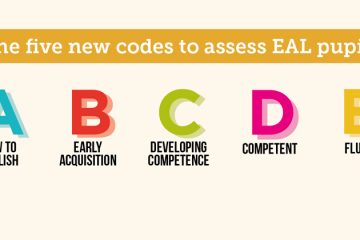Considering a school EAL policy
Most schools will have a number of policies which have relevance to the teaching, learning and well-being of EAL learners. Foremost of these will be the Equality and diversity policy. Schools in the UK have a statutory obligation under the Equality Act (2010) to promote equality of opportunity for pupils whatever their race, religion or belief as well as other protected characteristics.
In many schools, language will be subsumed within other policies such as the Literacy and communication policy. Some schools may include language in their equality policy. For schools with significant numbers of bilingual learners it is essential to produce a separate EAL policy. Schools need to think about how and when to promote and encourage the speaking and learning of community and heritage languages as well as English. They also need to consider the responsibilities of different staff working with EAL learners.
Schools may find it useful to consider the following questions:
- What will the school do to ensure that all learners of English as an additional language receive good teaching of English at the right level to enable them to make good progress?
- What will the school do to promote and value the learning of community and heritage languages? For example, are GCSEs and other qualifications available?
- How will the school respond to the need for bilingual learners and their families to use and maintain their home (first) languages? For example, can bilingual stories and books be used? Are dual-language dictionaries available?
- How will the school enable effective communication with the families of its EAL learners? Are letters home translated? Are there interpreters available for meetings and parent consultation events?
- What will the school do to ensure that all learners have full access to the curriculum and are able to reach their academic potential?
- What are the responsibilities of all staff in relation to developing the language and literacy of EAL learners across the school?
- What are the additional responsibilities of EAL specialist and bilingual support staff?
A model EAL Policy
Purposes
- To promote equality of opportunity for all learners for whom English is an additional language.
- To deliver a broad, balanced curriculum which reflects the needs of children for whom English is an additional language.
- To ensure EAL pupils reach their full potential.
Guidelines
- To promote academic achievement by grouping EAL pupils according to cognitive level rather than English language level.
- To identify language outcomes for all curriculum areas and include in medium-term and weekly planning.
- To promote and encourage the development of the children’s first languages in order to facilitate concept development in tandem with their acquisition of English.
- To provide pupils with access to resources which are age appropriate, at an appropriate language level, and are linguistically and culturally appropriate.
- To use key visuals and other strategies to support children’s access to the curriculum.
- To ensure that language and literacy are taught within the context of all subjects.
- To ensure that learners not yet fluent in spoken English or the language of the curriculum are entitled to receive planned support for their oracy and literacy skills.
- To actively liaise with parents to help them to support their children’s learning.
- To facilitate parents’ access to school life by providing dual language information and bilingual support especially for parents’ evenings, school events and workshops, and to monitor parental involvement.
- To ensure that EAL pupils are assessed in their first language where possible and where appropriate.
- To seek first language assessment to ensure the accurate identification of SEN.
- To monitor the results of statutory tests by language and ethnic group and set targets to address any underachievement identified.
- To provide all staff with high-quality professional development to develop their knowledge of EAL pedagogy and their skills for teaching EAL learners.
- To celebrate multilingual skills and promote linguistic diversity with all pupils.
The above model policy was produced by Bury local authority for its primary schools and adapted by Kick Start Enterprise 2016.
Supporting the EAL Policy
Whole school language development
All teachers will need to consider the language demands as well as the content of the curriculum and plan how they can support pupils to develop oracy and literacy across the curriculum.
In writing schemes of work and medium term plans, teachers should consider the following questions:
- What opportunities are there to explore ideas orally and collaboratively?
- How can teachers (or additional adults or other children) model the key subject language needed?
- What specialist vocabulary do pupils need in order to understand new concepts and how can this be presented to them in an accessible way?
- What range of texts do pupils need to read and how can their reading be scaffolded to support learners with diverse needs?
- What types of written tasks do pupils need to carry out and how can these be framed to support pupils at different levels?
- Are lessons planned to ensure that any additional adult has a clear role in developing literacy?
The role of class teachers is to:
- develop consistent approaches to teaching and learning in literacy and to build increased awareness of the existing language knowledge and understanding that pupils bring to lessons
- use speaking and listening strategies to develop subject learning
- plan for teaching and learning of subject-specific vocabulary
- develop active reading strategies to increase pupils’ ability to read for a purpose and engage with a variety of texts.
- model writing for key text types within their subject.
Language and literacy experiences of EAL learners
- Some pupils already have good language and literacy skills in two or more languages
- Some pupils are beginner EAL learners have never learnt to read or write in any language.
- Some pupils have missed some or all of their education and have not fully developed the language and literacy skills needed for primary school
- Some pupils have SEN with language or literacy needs
All these diverse groups benefit from teaching that develops their language and literacy so they become fluent in the academic language of the primary curriculum which is the key to academic success.
As pupils progress through school, the language and literacy demands of the curriculum increase and pupils need to develop a wider range of language skills, in particular making the transition from spoken to written forms. They also need to be able to adopt different styles (genres) to meet different purposes and audiences which need to be explicitly taught.
Beginner EAL learners
It takes 1-2 years to become fluent in everyday spoken English, but 5-7 years to develop proficiency in formal, written English. Pupils who are new to English will benefit from being integrated into mainstream teaching and learning experiences most of the time.
This enables them to;
- develop oral fluency quickly
- immediately feel part of the school
- develop language in context
- experience their full curriculum entitlement
Additional support in class and some small group literacy teaching will be beneficial in the early stages, although pupils should not necessarily be withdrawn from Maths, Modern Languages or practical subjects where they can usually make good progress whatever their language level in English.
Teaching strategies to support EAL beginners
- Provide a classroom rich in oral experiences
- Enable pupils to draw on their existing knowledge of other language/s
- Encourage and use bilingual support from other students and staff
- Use translated materials and bilingual dictionaries
- Allow students time to practice new language
- Use visual support of all kinds (diagrams, maps, charts, pictures, realia)
- Develop card sorting, sequencing and matching activities
Developing language and literacy skills
In order to be fully literate, pupils need to be able to understand how we adapt our every day speech into formal, written texts.
Learning through talk
- Using speaking to clarify and present ideas
- Using active listening to understand a topic
- Hypothesising, evaluating and problem solving through discussion
Teaching strategies
- Provide pre and post listening activities such as listening frames
- Use information gap and other collaborative activities
- Allow students to do some assessment orally
- Ask students to rehearse answer with partner before answering
- Use additional adults to support discussion groups
Learning from text
- Reading for meaning – inference and deduction
- Understanding how subject specific texts are organised
- Developing research and study skills
Teaching strategies
- Make the purpose of reading explicit
- Read aloud to pupils
- Teach pupils how to find their way around text books and use index, contents, etc.
- Show pupils how to write questions before starting research
- Help pupils decide whether to scan or skim read or close read
- Ask pupils to transfer information from text to diagrams
- Encourage and show pupils how to use the library for research and pleasure
Learning through writing
- Using writing to think, explore and develop ideas
- Structuring and organising writing to link ideas into paragraphs
- Developing clear and appropriate expression at sentence level
Teaching strategies
- Make sure pupil are clear about the purpose and audience for their writing
- Point out the differences between speech and writing
- Help pupils use appropriate level of formality
- Give pupils model texts before asking them to write
- Show pupils how to organise writing using planning frameworks, graphic organisers,
- Support extended writing with frames and key connectives to link ideas.
- Ask pupils to evaluate, correct and redraft their writing
The above guidance was adapted by Stephen Bray from British Council EAL Nexus Project, 2015.




0 Comments